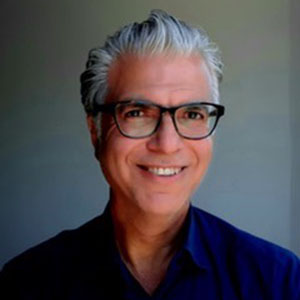
Devang Vaidya
Country: UK
Organization: Private practice
Short CV
Devang Vaidya. I am a person-centered therapist in a London-based practice for over 20 years. I have taught and presented person-centered, psychoanalytic, existential, body-oriented, and critical psychopathology approaches for many years. I am currently working on a doctoral thesis for a Kierkegaardian reconstruction of person-centered theory as a distinctive form of existence-oriented therapy.
Workshop
Title: The Polyphonous Paradox of Incongruence and Congruence in Human Selfhood
This workshop is based on a proposal that views Carl Rogers’ theory of incongruence and congruence as an existential paradox. Going beyond a conceptual analysis, the therapist hears this paradox as a polyphony of human selfhood, as a synthesis of the organism and the self-concept. A genuinely person-centred discourse is not simply a dialectical interaction but an embodied dialogue – an encounter – involving the affectivity of both persons. It is then that the self finds an optimum actualising direction, without being externally directed. The task remains unfinished since the imbalance – incongruence – is ontological; what Søren Kierkegaard refers to as ‘the thorn in the flesh’, a given of human existence. Hence, instead of viewing therapy as a mechanistic solution to problems having a beginning and an end, we remain patiently and faithfully attentive to the ongoing polyphonous middle – the ‘muddle’ – of human existence.
On this view, how should we understand the phrase ‘becoming oneself’? According to Aristotle’s principle of non-contradiction, it is not possible to be and not to be the same thing at once. Becoming implies a transition from one state to another, for example, from ice to water, from a caterpillar to a butterfly, from an infant to an adult. When it comes to human existence, this raises a Socratic question that scientific enquiry cannot answer: How can anyone become who one already is? So how can we take seriously the person-centred aim of congruence as becoming the self that one is? Here, Rogers’ self-proclaimed friend from Denmark, Kierkegaard comes to our rescue: ‘Becoming oneself’ implies another paradox: it includes both, change and continuity, movement and stability.
How do we experience our clients’ ‘becoming oneself’? What is our aim as person-centred therapists? What is its relevance to today’s world? We will workshop these questions in an experiential / reflective exercise based on a case study drawn from one of Kierkegaard’s lesser-known dramatic works, Repetition. We will conclude with an open reflection on how polyphony is a distinctive feature of person-centred dialogue.

